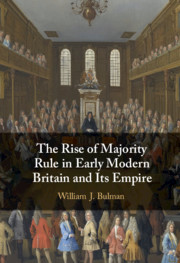Book contents
- The Rise of Majority Rule in Early Modern Britain and Its Empire
- The Rise of Majority Rule in Early Modern Britain and Its Empire
- Copyright page
- Dedication
- Contents
- Figures
- Tables
- Acknowledgments
- Note on the Text
- Abbreviations
- 1 Introduction
- 2 Consensus in the Commons, 1547–1642
- 3 Consensus Imperiled, 1640–1641
- 4 Consensus Destroyed, 1641–1643
- 5 Revolutionary Decisions, 1643–1660
- 6 The Majority Institutionalized, 1660–1800
- 7 Little Parliaments in the Atlantic Colonies, 1613–1789
- 8 Conclusion
- Bibliography
- Index
2 - Consensus in the Commons, 1547–1642
Published online by Cambridge University Press: 22 March 2021
- The Rise of Majority Rule in Early Modern Britain and Its Empire
- The Rise of Majority Rule in Early Modern Britain and Its Empire
- Copyright page
- Dedication
- Contents
- Figures
- Tables
- Acknowledgments
- Note on the Text
- Abbreviations
- 1 Introduction
- 2 Consensus in the Commons, 1547–1642
- 3 Consensus Imperiled, 1640–1641
- 4 Consensus Destroyed, 1641–1643
- 5 Revolutionary Decisions, 1643–1660
- 6 The Majority Institutionalized, 1660–1800
- 7 Little Parliaments in the Atlantic Colonies, 1613–1789
- 8 Conclusion
- Bibliography
- Index
Summary
This chapter describes the institutionalized form of consensual decision-making that prevailed in the House of Commons from the advent of consistent record-keeping in the Tudor period to the first two years of the Long Parliament. It highlights the role of status interaction in maintaining the primacy of consensual decisions while also specifying under what conditions these same status interactions occasionally resulted in meaningfully majoritarian decisions. Despite the presence of regular procedures that enabled majoritarian decision-making, the members of the early Stuart House of Commons almost completely avoided making decisions that were meaningfully majoritarian prior to the outbreak of the English Civil War. The House instead forged consensus with recourse to debate, committees, and a variety of other procedural mechanisms. They did so because enumerated votes (divisions) and meaningfully majoritarian voice votes had damaging status implications for Parliament, the Commons, and its members.
- Type
- Chapter
- Information
- Publisher: Cambridge University PressPrint publication year: 2021

